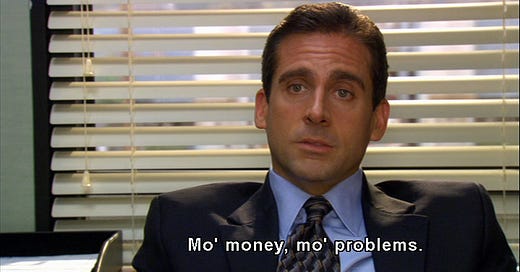Welcome to the MoneyNeverSleeps newsletter! Thanks to the 122 new fans who signed up for the newsletter this week.
If you’re reading this but haven’t subscribed, now’s the time to join!

I don't know what they want from me
It's like the more money we come across
The more problems we see
- ‘Mo’ Money, Mo’ Problems’ by Notorious BIG, Puff Daddy & Mase
Around 2,500 years ago, in Nepal, a son was born to a king. The king had this great idea: he wanted to make his son’s life perfect.
He built high walls around the castle and spoiled the child and made sure his son had everything he could possibly want. In a completely unexpected turn of events, his son grew up to be an ungrateful and unhappy prince!
One night, the prince snuck out of the castle and visited the local village. What he found there horrified him. For the first time ever, the prince saw human suffering: people sick & dying, extreme poverty, homelessness.
The prince returned to the castle facing an existential crisis and blaming his father for everything his father had done for him.
The prince decided to give up his royalty and run away. He left the palace and never returned, spending years living on the streets.
The prince suffered greatly. He suffered through disease, hunger, poverty, loneliness.
A few years went by before the prince realised that a life of suffering was not all it was cracked up to be. It didn’t bring him the insight he craved or satisfy his need for purpose.
The prince came to realise that suffering without purpose was not meaningful. Unsure what to do next, the prince went and found a big tree near a river.
As the story goes, the prince decided that he would not move from the tree until he came up with another grand idea of purpose.
After 49 days, the prince came to a great realisation: all life is a form of suffering.
He realised that all suffering is not equal but we all suffer nonetheless.
Years later, the prince would build his own philosophy and share it with the world. At the core of his philosophy is its first principle: that pain and loss are inevitable and we should not try to resist them.
The prince would go on to be known as the Buddha and founded the world's fourth-largest religion with over 520 million followers, or over 7% of the global population.
Why Should You Care?
Life is hard.
There is no such thing as an ‘easy’ life.
Happiness is not a solvable equation. It is not a case that if I get ‘X’, then I will be happy.
To me, life is essentially an endless series of problems. Solving one problem often leads to the creation of another.
Joining a gym and trying to solve a health problem creates problems around trying to fit this activity into a busy day and ensuring all other tasks get done.
Leaving a corporate job to found a startup solves a problem of wanting to start a company but adds a whole host of problems around job security, responsibility to employees, unending cashflow nightmares and/or insomnia.
Trying to carve out regular ‘date night’ with my wife during lockdown in a house with 5 kids solves the ‘spending time together’ problem but creates a problem of finding entertaining things to do together every week without leaving the house (open to suggestions here!)
Happiness comes from the feeling of solving problems. Solving good problems.
Don’t hope for an easy life or a life without problems.
There is no such thing.
Hope for a life of good problems - the problems that you want to solve regardless of how hard they may be to solve, or how many days, months or years it takes to solve them.
Tell me why I’m wrong…
- Eoin
Left Field
How do I describe ‘Left Field’? It’s a place to put the content (newsletters/articles, etc) that we have amassed over recent weeks or previous years that really make us think or change our thinking on a particular topic. All the content will offer an alternative view of some topic in financial services, technology or sport (or a combination of all three!)
Another fascinating article from one of my favorite writers, Malcolm Gladwell. Gladwell goes into detail about a big idea (that peers matter much more than parents) which runs counter to nearly everything that a century of psychology and psychotherapy has told us about human development.
Anyway, I won’t give away too much. Enjoy the article and feel free to get in touch to discuss more!
- Eoin
Can’t Sleep?

MoneyNeverSleeps podcast episode from this week:
Episode 107: Cross-Trainers | Sorcha Finucane and TrainedIn
Sorcha Finucane, Founder of TrainedIn, joins the show to talk about her inspiration for the business, the network effects of the platform, the ‘platformification’ of trust and referrals, the fairness of SME access to training vs. that of big business, how experience with both sides of the problem increases network value….and her life in an alternate universe in the military!
Podcast Recommendation: Highly recommend checking out ‘Capital University’ with entrepreneur/influencer Bryce Hall and well-known investor Anthony Pompliano. In this podcast, “Pomp” mentors Bryce and teaches him the basics of investing. The two co-hosts break down various investment strategies, explore ways to build generational wealth, and discuss the challenges that arise from being young, rich, and famous.
Book Recommendation: I highly recommend the book ‘Risk: The Science and Politics of Fear’ by Dan Gardner. Speaking to psychologists and scientists, as well as looking at the influence of the media and politicians, Gardner uncovers one of the central puzzles of our time: why are the safest people in history living in a culture of fear?
Article/Newsletter Recommendation: Highly recommend you check out ‘Brain Food’ by Shane Parrish and Farnam Street. Brain Food is a free, weekly email, that sharpens your mind and keeps you learning. It’s full of unique and timeless ideas for the conduct of life and business.
This newsletter has been written by Eoin Fitzgerald and Pete Townsend
Want more MoneyNeverSleeps?
Check out the MoneyNeverSleeps Podcast on Apple Podcasts, Spotify and all major podcast platforms.



